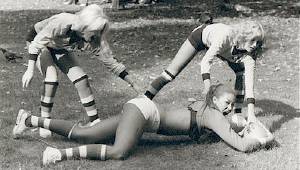
 | Charmantes Damenrugby - better than ever! |
Montag, 26. Februar 2007
i just had to share this with you: mutant, 19:01h
www.betterrugbycoaching.com - Dan Cottrell - www.rugby-coach.com (good opportunity to finally mention the great coaching tips) Taking The Fear Out Of Refereeing Unless you are extremely lucky, and particularly if you‚re a youth team coach, you or one of your fellow coaches will be refereeing every home game. This can be one of the most stressful and terrifying experiences of your week, and very frustrating. Here is my simple guide to what steps you can take to make it more enjoyable.
Laws Have a list of the laws that are applicable to the age group you are refereeing, plus some other key areas of the game. (I like to keep a printed sheet, possibly photocopies, with me.) Then, with the other team‚s coach, confirm the laws, so they can communicate any variations to their team. Common grey areas: Scrum-half positioning ˆ for instance, are they preventing fair release of the ball from the back of the scrum? The distance players must stand back from scrums, lineouts and penalties. What constitutes a high tackle? And, in youth rugby, what constitutes a hand-off? If these ground rules (and note the use of ground, because sometimes there is a dispute which needs to be resolved at the ground) are agreed before kick off, it can prevent a number of the disputes that breed bad feeling during the game. Pitch Problems can often occur when the pitch is redefined for younger players, e.g. a pitch is divided into halves or quarters. The main problem is often the length of the dead ball area. How many times have tries been scored amongst the spectators? Though a line would be ideal, you can use a few cones, tracksuit tops or trainers instead. This makes sense for safety reasons as much as for the players.
I have a few simple policies. If I think an injury is serious, I stop the game. If the play moves towards an injured player, I stop the game. If I don‚t feel there is adequate back up to come onto the pitch, I stop the game. Otherwise, if a player goes down, then I expect the coach to come on immediately to deal with the situation. Meanwhile, I try to keep the game going. If the coach then feels there is a problem, he/she can ask me to stop the game. In youth rugby, tears are very emotive. They are not always a good indication of a true injury. Tired younger players are prone to tears. It is not cavalier to then carry on with a game, unless a player is injured. 3. High tackles High tackles is an area that causes controversy, especially amongst players with poor technique. It is generally thought to be difficult to tell the difference between an accidental high tackle and one done with intent to harm. In youth rugby, I suggest taking the following line: most high tackles at this level are accidental. The law states the following: a player must not tackle (or try to tackle) an opponent above the line of the shoulders. A tackle around the opponent‚s neck or head is dangerous play. Two points arise from the interpretation of the law: i. Any high tackle deserves a penalty, with an appropriate stoppage of the game to deal with the „tackling" player. A second high tackle by the same player may require a sin bin, substitution or a strong word with the captain or coach. ii. Any tackle that starts at the shoulder level is very likely to rise up, so don‚t be afraid to be very tough. Finally on dangerous tackling, swinging players around by their collars should be a penalty.
The IRB Charter on the laws of the game states: „The Laws must be applied in such a way as to ensure that the game is played according to the Principles of Rugby."The main principles are to be fair, consistent, with the aim of rewarding skilful play. Ideally the referee will have a strong knowledge of the game, but in practice this is not always going to be the case. Therefore the referee needs to manage the game as fairly as possible with what they know, and want to learn to improve for the next game. ... Comment |
online for 8833 Days
last updated: 23.10.14, 23:27  Youre not logged in ... Login

Unser Rugby-Imperium:
Maedchenrugby-Blog Bremer-Frauenrugby Blog Rugby-Turniere Blog Ruckosphere Blog Womensrugby@Flickr 
Frauenrugby im Netz:
Scrumhalf Connection - Blog Saturday, Rugby Day - Blog Put me in, Coach! - Blog Entebbe Sharks - Maedchenrugby in Uganda The Mamas - Moms play rugby too! 

komischer artikel... http://www.spiegel.de/gesundheit/ernaehrung/achillessehnenriss-und-co-so-trainiert-und-staerkt-man-seine-sehnen-a-972459.html
by mutant (01.06.14, 17:55)
mehr ueber crossfit, diesmal ohne
kotzen, dafuer mit doping! http://www.t-nation.com/powerful-words/crossfit-and-steroids http://romanoroberts.com.mx/steroids-crossfit-and-the-crossfit-games-who-how/
by mutant (12.05.14, 22:05)
crossfit, das mit dem kotzen!
http://www.salon.com/2013/09/08/crossfit_nation_partner/
by mutant (09.09.13, 13:39)
mal was einfach nur fuer
female athletes: http://pelvicguru.com/2013/06/22/dear-crossfit-and-crossfit-gynecologist-im-appalled-theres-help-for-peeing-during-workouts/
by mutant (26.06.13, 00:47)
Unglaublich! School won’t let 12-year-old
girl play football because of “lusting” male teammates
by mutant (25.06.13, 00:12)
fussball besser als laufen? http://www.netzathleten.de/Sportmagazin/Sports-Inside/Frauen-werden-fitter-durch-Fussball/7713792943858301254/head?referrer=727811194385898729
wette, das gilt auch fuer rugby. ueberhaupt macht das cardiogedoense...
by mutant (29.04.13, 12:41)


|
||||||||||||||||||||||||||||||||||||||||||||||||||||||||||